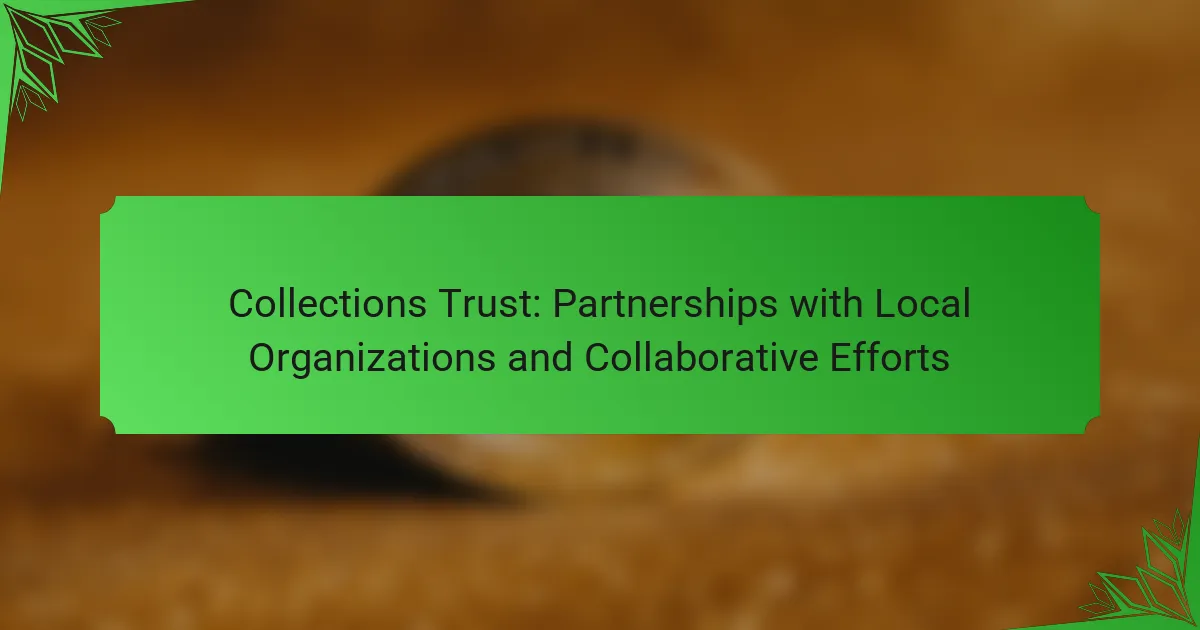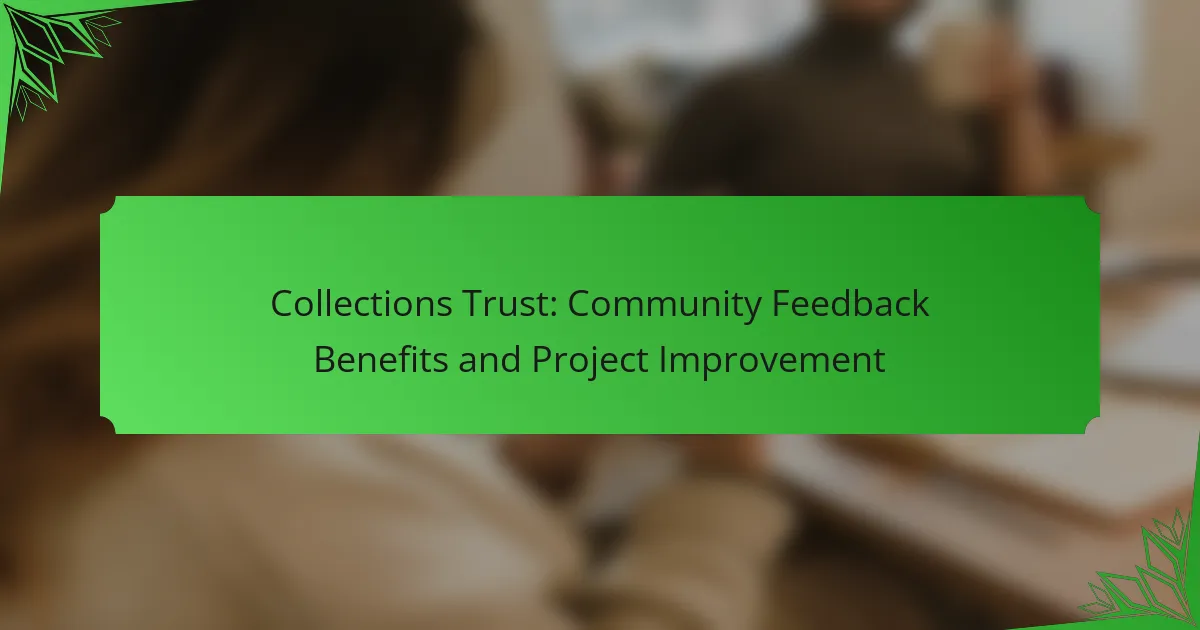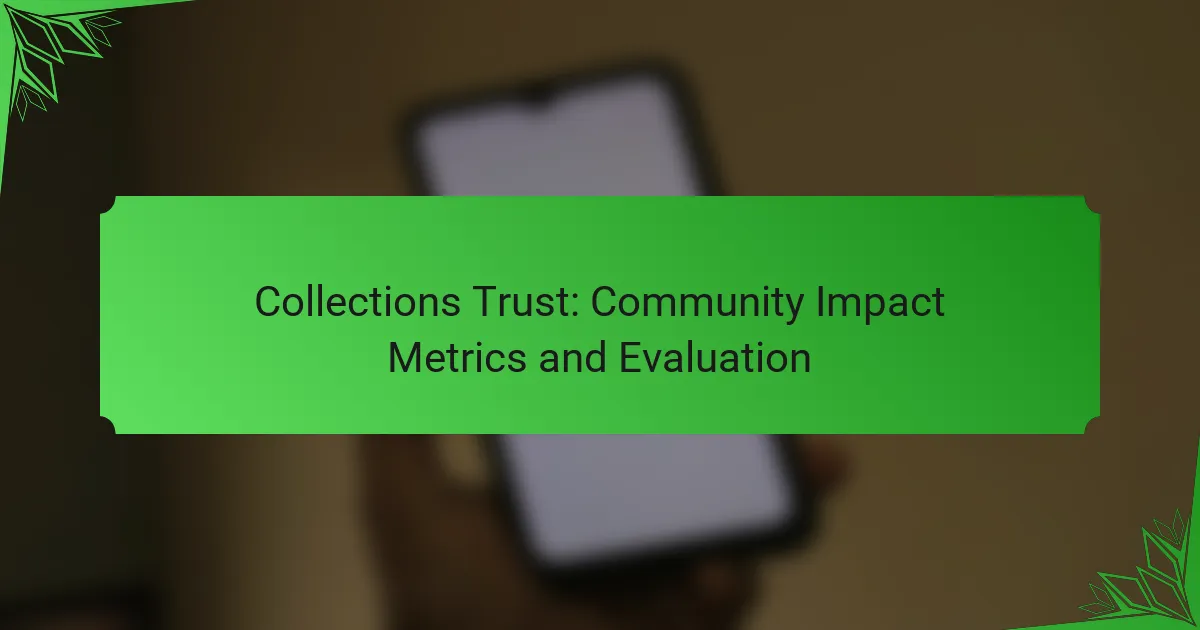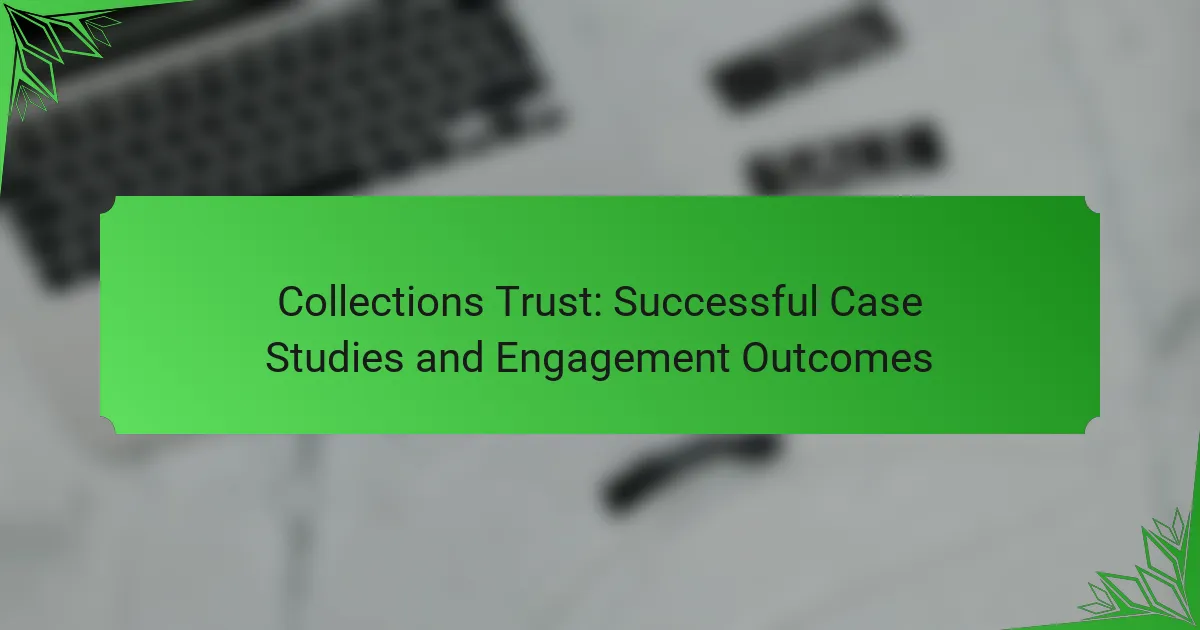Collections Trust actively collaborates with local organizations across the UK to enhance cultural heritage initiatives through strategic partnerships. By sharing knowledge, resources, and expertise, these collaborations aim to strengthen community engagement and support for museums and cultural institutions, ultimately leading to innovative solutions and expanded outreach.
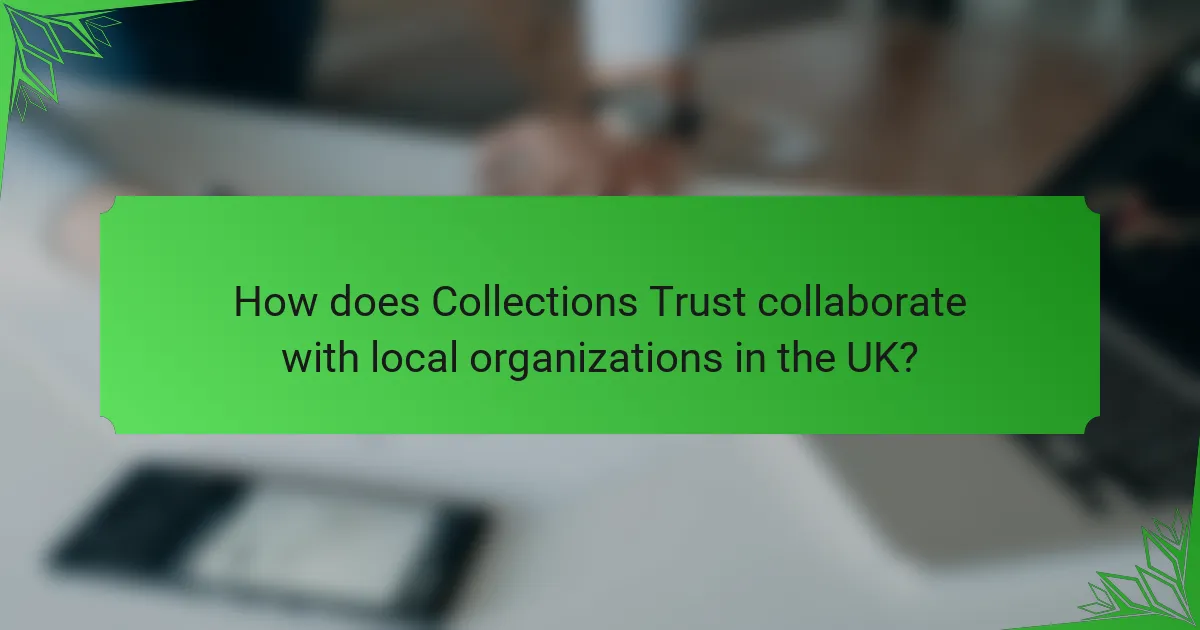
How does Collections Trust collaborate with local organizations in the UK?
Collections Trust collaborates with local organizations in the UK by forming strategic partnerships that enhance cultural heritage initiatives. These collaborations focus on sharing knowledge, resources, and expertise to strengthen community engagement and support for museums and cultural institutions.
Partnerships with museums
Collections Trust partners with various museums across the UK to improve collections management and accessibility. These partnerships often involve joint projects that aim to digitize collections, making them more accessible to the public and researchers alike.
By working together, museums can share best practices and resources, leading to enhanced visitor experiences and more effective conservation efforts. For example, a partnership might focus on developing a shared digital platform for cataloging artifacts.
Engagement with community groups
Engagement with community groups is a vital aspect of Collections Trust’s strategy. By collaborating with local organizations, they can better understand community needs and interests, ensuring that cultural initiatives are relevant and inclusive.
These engagements often include workshops, events, and outreach programs that invite community members to participate in cultural activities. Such initiatives foster a sense of ownership and pride in local heritage, encouraging broader participation in cultural events.
Joint educational programs
Collections Trust develops joint educational programs with local organizations to promote learning and awareness of cultural heritage. These programs often target schools and community centers, providing resources and training for educators.
For instance, a program might include hands-on workshops where students can learn about local history through artifacts. This approach not only educates but also inspires future generations to appreciate and preserve their cultural heritage.
Shared resources and expertise
Sharing resources and expertise is fundamental to the collaborations facilitated by Collections Trust. This includes access to training materials, funding opportunities, and expert consultations that can help local organizations enhance their operations.
For example, Collections Trust may provide guidance on best practices for collections care or assist in developing grant proposals to secure funding for specific projects. This collaborative approach maximizes the impact of limited resources across the sector.

What are the benefits of partnerships for Collections Trust?
Partnerships for Collections Trust provide numerous advantages, including improved resource sharing, enhanced visibility, and increased community impact. Collaborating with local organizations fosters a supportive environment that can lead to innovative solutions and expanded outreach.
Enhanced community outreach
Partnerships significantly improve community outreach by leveraging the strengths of local organizations. By working together, Collections Trust can tap into established networks, ensuring that programs and initiatives reach a broader audience.
For example, collaborating with schools or community centers can facilitate workshops and events that engage diverse groups. This approach not only raises awareness but also builds trust and relationships within the community.
Increased funding opportunities
Collaborative efforts often lead to increased funding opportunities, as joint applications can demonstrate a wider impact. Many grant programs favor projects that involve multiple stakeholders, making partnerships a strategic advantage.
Collections Trust can explore funding from local government initiatives, private foundations, and corporate sponsorships. By pooling resources and expertise, partners can create compelling proposals that attract financial support.
Broader audience engagement
Engaging a broader audience is a key benefit of partnerships for Collections Trust. By combining resources and knowledge, organizations can create more dynamic and inclusive programs that appeal to various demographics.
For instance, hosting joint events or exhibitions can attract different community segments, from families to art enthusiasts. This diversity not only enriches the experience but also fosters a sense of belonging and shared ownership among participants.

What collaborative efforts are currently underway?
Collaborative efforts are actively being pursued to strengthen partnerships with local organizations, enhancing community engagement and resource sharing. These initiatives focus on leveraging local heritage, education, and cultural resources to foster a richer understanding of collections and their significance.
Projects with local heritage sites
Collaborations with local heritage sites aim to promote awareness and preservation of cultural assets. These projects often involve joint exhibitions, guided tours, and educational programs that highlight the historical significance of the sites. For example, partnerships may include co-hosting events that draw attention to local artifacts and their stories.
Engaging local communities in these initiatives can lead to increased visitor numbers and heightened interest in heritage conservation. It is essential to ensure that these projects align with the values and narratives of the heritage sites involved.
Collaboration with educational institutions
Working with educational institutions creates opportunities for students to engage with collections in meaningful ways. These collaborations can include internships, workshops, and research projects that allow students to explore the collections while contributing to their management and interpretation.
Educational partnerships can also facilitate curriculum development that incorporates local history and culture, fostering a deeper connection between students and their community. Institutions should consider aligning their programs with local educational standards to maximize impact.
Initiatives with cultural organizations
Collaborative initiatives with cultural organizations focus on enriching community cultural life through shared resources and programming. These partnerships can lead to joint festivals, art shows, and cultural exchanges that celebrate local traditions and diversity.
To ensure success, it is crucial to establish clear communication and shared goals among all partners. Regular meetings and feedback sessions can help maintain alignment and address any challenges that arise during collaboration.
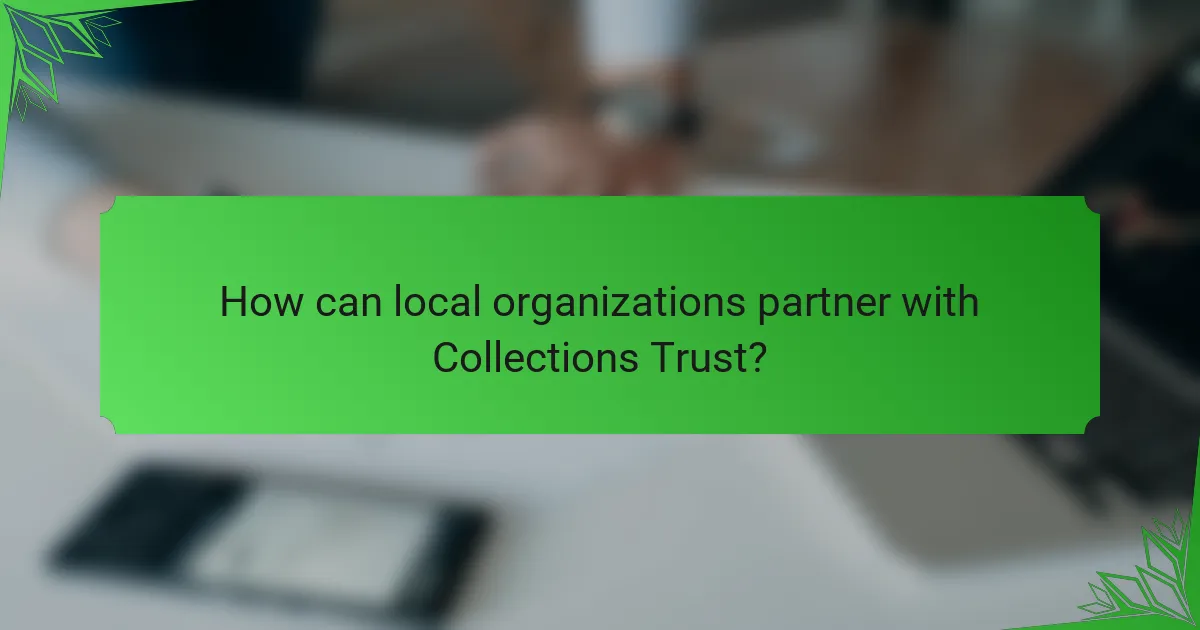
How can local organizations partner with Collections Trust?
Local organizations can partner with Collections Trust by engaging in collaborative projects that enhance cultural heritage and community engagement. These partnerships often focus on shared goals such as preservation, education, and accessibility of collections.
Application process for collaboration
The application process for collaboration with Collections Trust typically involves submitting a proposal that outlines the project objectives, expected outcomes, and how the partnership will benefit both parties. Organizations should prepare to provide details about their mission, target audience, and any relevant experience.
Once the proposal is submitted, it will be reviewed by Collections Trust staff. If the project aligns with their strategic goals, the organization may be invited for further discussions to refine the project scope and partnership terms.
Criteria for partnership eligibility
Eligibility for partnership with Collections Trust generally requires that the local organization has a clear mission related to cultural heritage, education, or community service. Organizations should demonstrate a commitment to inclusivity and accessibility in their projects.
Additionally, potential partners are often evaluated based on their capacity to manage collaborative projects effectively, including having adequate resources and a track record of successful initiatives. It is beneficial for organizations to show how their project aligns with the goals of Collections Trust and contributes to the broader community.
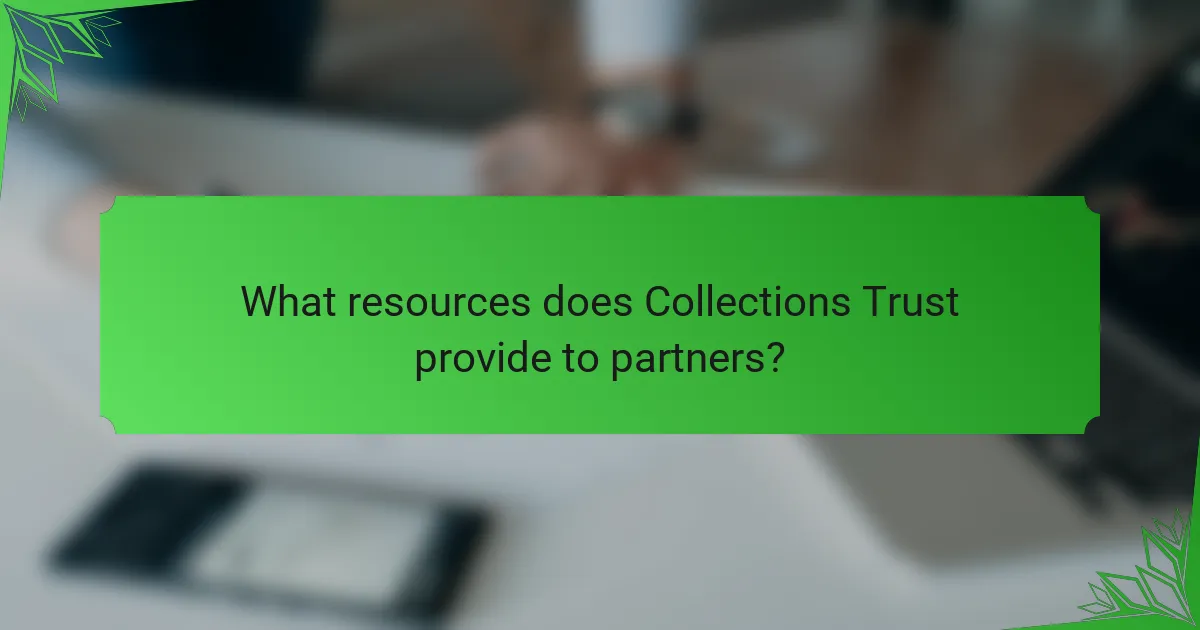
What resources does Collections Trust provide to partners?
Collections Trust offers a variety of resources to partners, including training programs, best practice guidance, and networking opportunities. These resources are designed to enhance collaboration and improve the effectiveness of local organizations in managing collections.
Access to training programs
Collections Trust provides access to comprehensive training programs tailored for partners. These programs cover essential topics such as collection management, digital preservation, and audience engagement strategies. Participants can expect to gain practical skills that can be applied directly to their work.
Training sessions may be offered in various formats, including online webinars and in-person workshops, accommodating different learning preferences. Organizations can benefit from both introductory courses and advanced training, depending on their needs.
Guidance on best practices
Partners receive guidance on best practices for managing collections effectively. This includes resources that outline standards for documentation, conservation, and exhibition planning. By following these best practices, organizations can ensure the longevity and accessibility of their collections.
Collections Trust also shares case studies and examples from successful partnerships, providing practical insights that can be adapted to different contexts. This guidance helps organizations avoid common pitfalls and implement strategies that have proven successful in the field.
Networking opportunities
Networking opportunities are a key resource provided by Collections Trust, allowing partners to connect with other organizations and professionals in the field. These connections can lead to collaborations, knowledge sharing, and support networks that enhance collective efforts.
Regular events, such as conferences and forums, are organized to facilitate these networking opportunities. Partners are encouraged to engage actively, share their experiences, and learn from one another, fostering a community focused on improving collection management practices.






